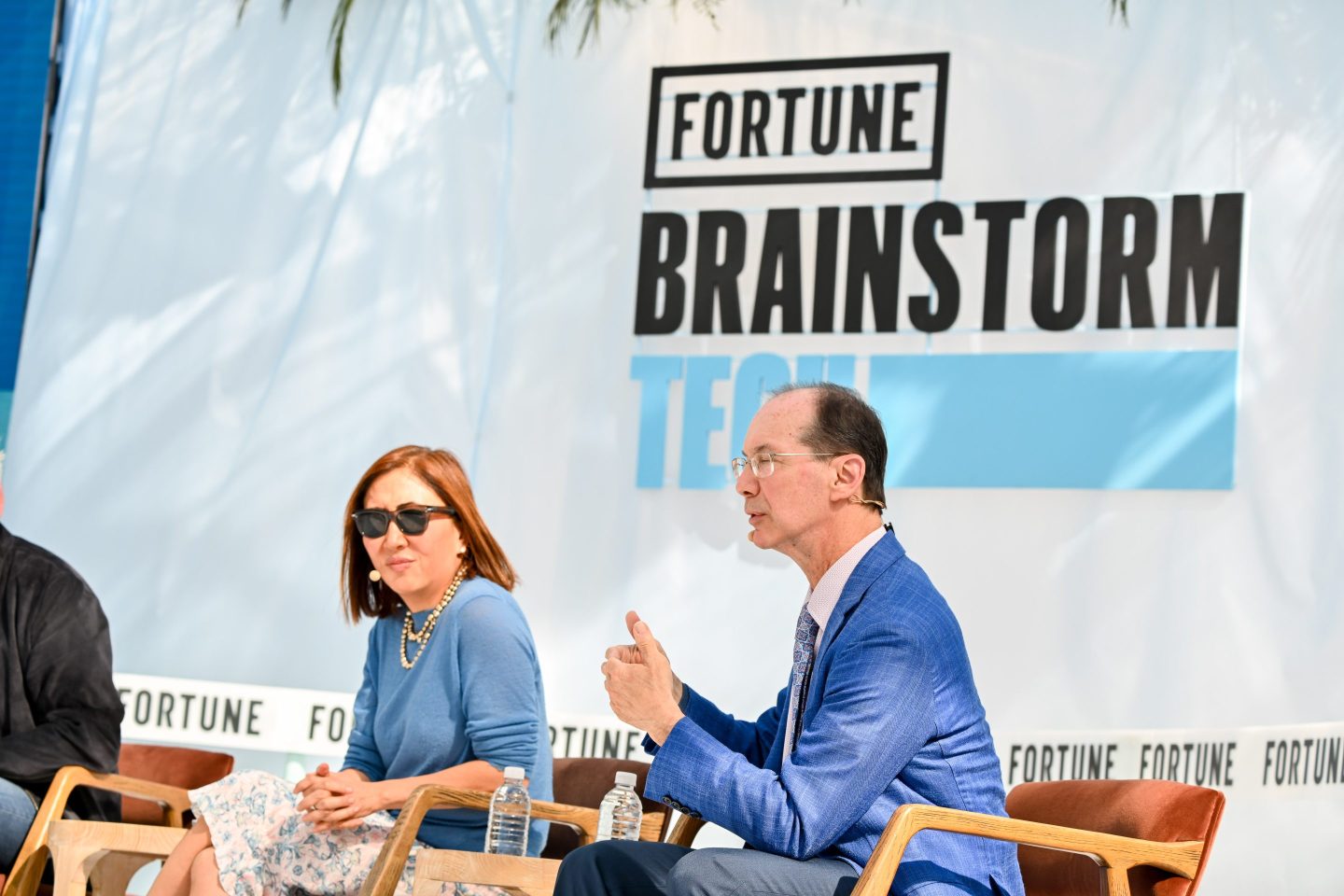When Google turned the dominant search engine round 2004, not everybody was comfortable. Everybody from e book publishers to music studios blasted the corporate for serving to itself to copyrighted content material with out paying. The search large ultimately smoothed issues over however now, twenty years later, Google has turn into the media business’s villain another time—this time for gobbling that very same content material to coach its AI instruments.
Talking at Fortune’s Brainstorm Tech convention on Wednesday, Individuals Inc CEO Neil Vogel—whose agency’s titles embody Individuals and Meals & Wine—mentioned different large AI corporations are paying for publishers to make use of the content material they create, however that Google has to date refused.
“Some AI outlets are good actors. Open AI is an effective man,” mentioned Vogel. “The worst man is Google.”
Vogel made his feedback throughout an on-stage panel dialogue about the way forward for digital media within the new AI-driven web. The feedback come as media and information publishers are squaring off with AI firms on the deal desk and within the courtroom. The New York Instances has sued OpenAI alleging that it educated its chatbots on its content material with out permission or fee. OpenAI has referred to as the swimsuit baseless.
Cloudflare CEO Matthew Prince, who was additionally on Wednesday’s Brainstorm panel, mentioned it has turn into far more durable for web sites to draw visitors at a time when AI corporations function “reply engines” that present what individuals are on the lookout for in fast snippets.
Prince noticed that, up to now, Google served as a “nice patron” to the Web by ingesting the content material of net pages as a way to show hyperlinks to these pages in response to individuals’s search queries. This association directed visitors to firms’ web sites, providing them an opportunity to generate income from the guests.
At the moment, that visitors is falling dramatically since AI-generated solutions usually present all the knowledge customers want. Google is amongst these supplying AI solutions based mostly on data it has crawled from firms’ web sites however, in contrast to its conventional search outcomes, Google’s AI solutions don’t ship the identical visitors to web sites—main the likes of Vogel to stress that publishers have already traded analog {dollars} for digital dimes, and at the moment are buying and selling these dimes for AI pennies.
Within the case of different large AI firms, publishers have obtained some leverage by working with corporations like Cloudflare to chop off the so-called crawlers that learn and ingest their content material. Within the case of Google, although, that hasn’t proved a viable choice for the reason that firm’s crawler for AI is identical because it makes use of for displaying search outcomes. A writer intent on stopping Google’s AI machine from crawling its content material must sacrifice its discoverability in search too.
Vogel famous that, whereas Google searches are bringing much less visitors to Individuals Inc web sites than up to now, they nonetheless account for between 25-30% of visits, making it financially unviable to chop off the corporate’s crawlers. He added that some AI corporations have already agreed to pay content material creators—together with Anthropic, which this month reached a $1.5 billion settlement with e book publishers—and that others are actively engaged on comparable preparations. The exception is Google, which Vogel dubbed a “unhealthy actor.”
Google declined to touch upon Vogel’s remarks.
The YouTube mannequin as a potential answer
The present controversy over Google and different large AI’s use of others’ content material has robust echoes of the early web period. That period—and Google—can also supply an answer. Invoice Gross, an influential early Web determine credited with pioneering the paid search promoting enterprise mannequin and who’s now founder and writer of ProRata.ai, factors to what occurred with YouTube, which Google acquired in 2006.

Stuart Isett/Fortune
In its early days, YouTube outraged content material creators like musicians and film studios by letting customers blatantly pirate their content material. This triggered a sequence of lawsuits however, in time, YouTube got here up with a compromise: It could give creators the choice to monetize their content material by means of promoting. That answer has proved workable and mutually useful for greater than a decade—Google says it has paid greater than $12 billion in shared advert income to rights holders as of December 2024—and Gross says it might work equally effectively for the AI period.
“The fitting solution to clear up this isn’t with lawsuits however with royalties,” mentioned Gross, whose agency affords AI-related monetization choices. “It opens up incentives for many new content material to be created.”
Prince sounded much more bullish, predicting a “golden age” the place AI firms would supply annual funds to those that produced distinctive and beneficial content material. He cited latest offers by which OpenAI agreed to pay the New York Instances, Reddit and others.
Not everybody, nonetheless, is optimistic that the AI period shall be an enchancment. Janice Min, the CEO of Ankler Media, says that the previous twenty years present that large tech platforms like Google and Fb could quickly create preparations that profit publishers—however that they’ll abruptly yank them away as quickly as they get what they want.
“I don’t see any profit to partnerships with AI,” mentioned Min. “I see the tech story occurring over and over. They arrive in and give you cash and it’s arduous to not say no to shiny issues.”
Min says Ankler has blocked all AI crawlers and is sticking with its technique of constructing a media enterprise round paid newsletters and Substack content material as an alternative.

